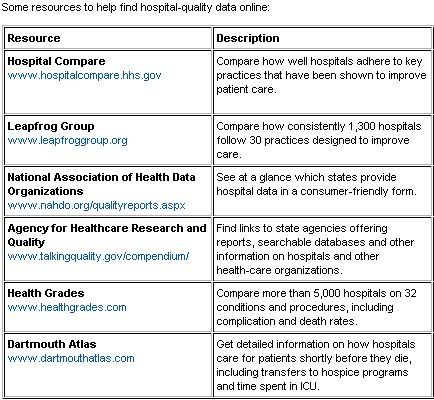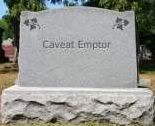How to Size Up Your Hospital Improved Public Databases Let People Compare Practices and Outcomes; The Importance of Looking Past the Numbers source: The Wall Street Journal
The push for more public hospital information is also part of a larger effort to improve health-care quality and ultimately lower health-care costs. Such public comparisons sometimes make hospitals and doctors uneasy, but disclosure can also inspire change, says Marc Volavka, executive director of the Pennsylvania Health Care Cost Containment Council, which analyzes data on hospitals in that state. "If in the light of day, problems are shown," he says, "that spurs improvement more than anything else you can imagine."

source: The Wall Street Journal
Although online tools make hospital comparisons more thorough than ever, experts say other factors matter too, including such abstractions as reputation...reputation often boils down to word of mouth. Pay particular attention to recommendations, or warnings, from people who work at hospitals you're considering, experts say.
Patients should also probe beyond a hospital's general reputation -- even a good hospital may not be good at everything. "You don't necessarily want to shop your hospital in general," Dr. Collier says. "You want to shop your specific procedure or condition."
And consider calling the hospitals directly: Quality departments or medical staff offices can be a good place to start. Most facilities will take pains to answer questions about how often they (and individual doctors) perform procedures, for example. They know it's bad business to refuse, Dr. Collier says.

source: The Wall Street Journal
Although online tools make hospital comparisons more thorough than ever, experts say other factors matter too, including such abstractions as reputation...reputation often boils down to word of mouth. Pay particular attention to recommendations, or warnings, from people who work at hospitals you're considering, experts say.
Patients should also probe beyond a hospital's general reputation -- even a good hospital may not be good at everything. "You don't necessarily want to shop your hospital in general," Dr. Collier says. "You want to shop your specific procedure or condition."
And consider calling the hospitals directly: Quality departments or medical staff offices can be a good place to start. Most facilities will take pains to answer questions about how often they (and individual doctors) perform procedures, for example. They know it's bad business to refuse, Dr. Collier says.






No comments:
Post a Comment